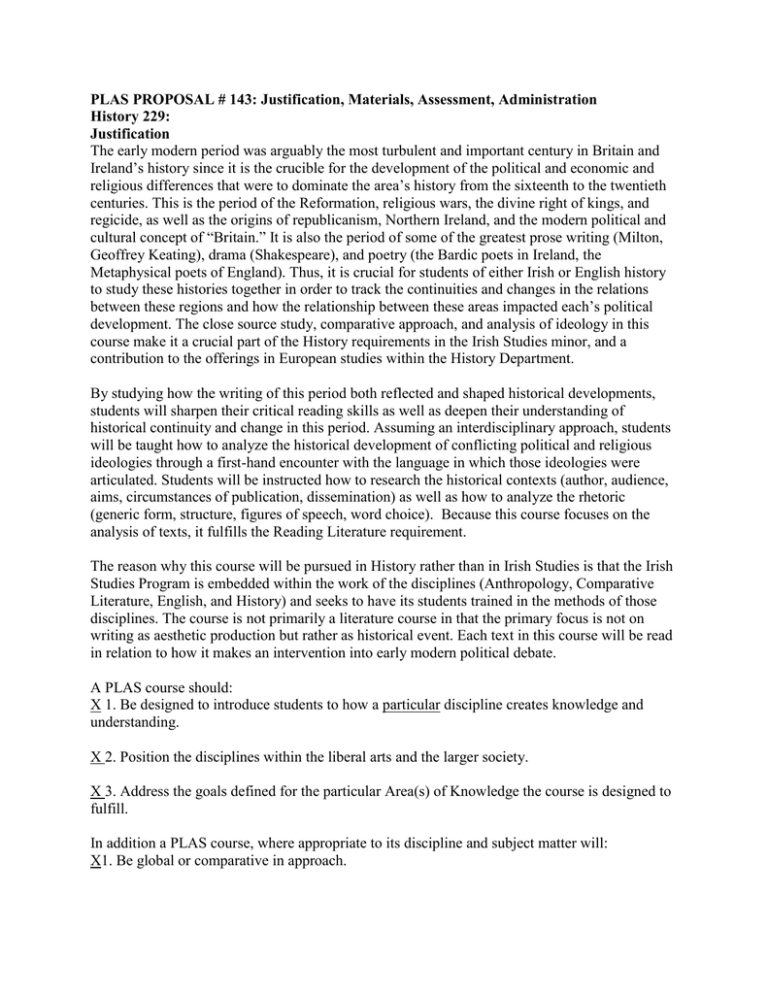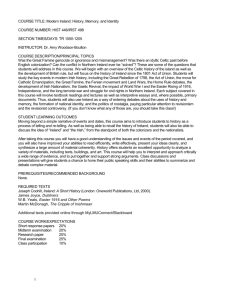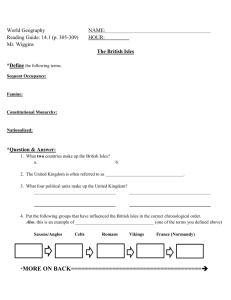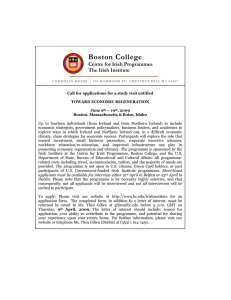PLAS PROPOSAL # 143: Justification, Materials, Assessment, Administration History 229: Justification
advertisement

PLAS PROPOSAL # 143: Justification, Materials, Assessment, Administration History 229: Justification The early modern period was arguably the most turbulent and important century in Britain and Ireland’s history since it is the crucible for the development of the political and economic and religious differences that were to dominate the area’s history from the sixteenth to the twentieth centuries. This is the period of the Reformation, religious wars, the divine right of kings, and regicide, as well as the origins of republicanism, Northern Ireland, and the modern political and cultural concept of “Britain.” It is also the period of some of the greatest prose writing (Milton, Geoffrey Keating), drama (Shakespeare), and poetry (the Bardic poets in Ireland, the Metaphysical poets of England). Thus, it is crucial for students of either Irish or English history to study these histories together in order to track the continuities and changes in the relations between these regions and how the relationship between these areas impacted each’s political development. The close source study, comparative approach, and analysis of ideology in this course make it a crucial part of the History requirements in the Irish Studies minor, and a contribution to the offerings in European studies within the History Department. By studying how the writing of this period both reflected and shaped historical developments, students will sharpen their critical reading skills as well as deepen their understanding of historical continuity and change in this period. Assuming an interdisciplinary approach, students will be taught how to analyze the historical development of conflicting political and religious ideologies through a first-hand encounter with the language in which those ideologies were articulated. Students will be instructed how to research the historical contexts (author, audience, aims, circumstances of publication, dissemination) as well as how to analyze the rhetoric (generic form, structure, figures of speech, word choice). Because this course focuses on the analysis of texts, it fulfills the Reading Literature requirement. The reason why this course will be pursued in History rather than in Irish Studies is that the Irish Studies Program is embedded within the work of the disciplines (Anthropology, Comparative Literature, English, and History) and seeks to have its students trained in the methods of those disciplines. The course is not primarily a literature course in that the primary focus is not on writing as aesthetic production but rather as historical event. Each text in this course will be read in relation to how it makes an intervention into early modern political debate. A PLAS course should: X 1. Be designed to introduce students to how a particular discipline creates knowledge and understanding. X 2. Position the disciplines within the liberal arts and the larger society. X 3. Address the goals defined for the particular Area(s) of Knowledge the course is designed to fulfill. In addition a PLAS course, where appropriate to its discipline and subject matter will: X1. Be global or comparative in approach. X 2. Consider diversity and the nature and construction of forms of difference. X 3. Engage students in active inquiry. X. 4. Reveal the existence and the importance of change over time. X. 5. Use primary documents and materials. III. Course Materials, Assignments, and Activities. Sample Readings / Course Texts Barry Coward, The Stuart Age: England 1603-1714. 3rd ed. London, 2003. A survey of political developments that begins with the first Stuart James I and ends with the death of Queen Anne and the ascent of the Hanoverians. This textbook covers the civil war, religious differences among Catholics, Protestants and non-conformists, and the political and military battles between royalists and parliamentarians. Colm Lennon, Sixteenth Century Ireland, Dublin, 2005. A narrative history of the English conquest of Ireland in the sixteenth century. The final chapters of the book focus on the Nine Years War that is crucial to an understanding of the Ulster Plantation. Shakespeare, Richard II (1595) This important historical drama is a particularly telling example of how popular late sixteenthcentury drama represented the problems of monarchical rule. The text will be read in relation to its use by supporters of Robert Devereaux, Earl of Essex, who had this play performed on the eve of their rebellion against Queen Elizabeth in 1601. Shakespeare, Macbeth (1606) This revenge tragedy, referred to as “the Scottish play,” highlights the reign of James I, the first king of both Scotland and England on the throne. The topical allusions to the Gunpowder Plot are considered in relation to this play’s relationship to religious and political fault lines in the reign of the first Stuart. Francis Bacon, Novum Organum (1620) This text promotes the inductive method of reasoning and so plays an important role in the establishment of scientific method. James VI of Scotland, True Law of Free Monarchies (1598) Written by James Stuart before he assumed the throne of England in 1603, this document sets out the argument of the divine right of kings in attempt to establish the basis for absolute monarchy as opposed to the contractarian concept of monarchy. Edmund Spenser, A View of the Present State of Ireland (c. 1596) A founding text of English colonial discourse, Spenser’s A View circulated in manuscript in the first quarter of the seventeenth century and provided one of the models for the structure of the Ulster Plantation. Bardic Poetry A selection of poems translated from Irish into English in an attempt to represent some of the ideology of the early modern Gaelic elite who continued to write poetry even after the political demise of the their leaders: Laoiseach Mac an Bhaird, “On the Cutting Down of an Ancient Tree,” Tadhg Dall O Huiginn, “AVisit to Eniskillen,” “Brian N Murrtha,” Aonghus O Dalaigh, “On Eire,” Eochaidh O hEoghusa, “Metamorphosis 1603.” Eoghan Rua Mac an Bhaird, “Looking towards Spain,” Fear Flatha O Gnimh, “The Death of Ireland.” These poems will be analyzed in terms of the Irish reaction to the New English conquest and plantation, the rise of the Stuarts and the defeat of the Gaelic political order in 1603, the departure of the aristocratic elite in 1607. Metaphysical and Political Poetry Poetry by Donne, Herbert, Marvell, and Crashaw will be read to demonstrate the varieties of religious experience in seventeenth-century English poetry. Important political poems such as Marvell “Horatian Ode upon Cromwell’s Return from Irleland” and Katherine Philips’ “Upon the Double Murder of King Charles I” will also be read later in the semester in conjunction with the unit on the War of the Three Kingdoms. Geoffrey Keating, History of Ireland (c. 1634) The first history of Ireland in modern prose Irish, this text covers the period up until the Norman conquest of Ireland, which is presented as contrasting in significant ways from the late sixteenthand early seventeenth-century English conquest. The first part of the text contains a critique of New English historiography. Charles I, Eikon Basilike and John Milton, Eikonoklastes Selections from this royalist tract, ghost-written by John Gauden, that presents Charles I as an Anglican martyr will be read alongside corresponding passages in Milton’s chapter by chapter refutation in Eikonoklastes (meaning “The Image Breaker”). John Milton, Areopagitica (1643) Taking the title from the name for the seat of the Athenian Council of State established by Solon in the sixth century B.C.E, Milton’s great prose tract presents his critique of the Parliament’s ordinance of 14 June 1643 “to prevent and suppress the license of printing,” and his defense of freedom of the press. John Lilburne, England’s New Chains Discovered (1648) When the House of Commons rejected the reforms of the Levelers (such as universal suffrage, freedom of speech and religion, freedom from exorbitant taxation), John Lilburne responded with this speech which reviewed the Levelers’ concern with and criticized Cromwell’s betrayal of these egalitarian policies. Thomas Hobbes, Leviathan (1651) Selections from this important text in the history of political thought will be read to introduce the student’s to Hobbes’ concept of “the state of nature” and the need for a social contract and strong central government to prevent civil unrest and maintain order. Course Objectives By studying how the writing of this period both reflected and shaped historical developments, students will sharpen their critical reading skills as well as deepen their understanding of historical continuity and change in this period. Assuming an interdisciplinary approach, students will be taught how to analyze the historical development of conflicting political and religious ideologies through a first-hand encounter with the language in which those ideologies were articulated. Students will be instructed how to research the historical contexts (author, audience, aims, circumstances of publication, dissemination) as well as how to analyze the rhetoric (generic form, structure, figures of speech, word choice). Through this close reading of primary texts, students will develop a sense of how the same historical events can be differently construed by competing and yet interdependent religious, political, and cultural constituencies. Course Requirements The course will be run as a lecture with discussion. The first class of each week will be a comprehensive lecture on the historical period covered for that week, including the opportunity for students to ask questions about the lecture and the narrative historical readings upon which the lecture is based. The second class will contain discussion in which small groups of four or five, set up within the class, will report to the entire class on critical questions concerning the primary texts assigned for that week. Each group will report to the class as a whole, in effect teaching a portion of the text through close reading and analysis to the rest of the class. Each of the four paper topics will require the students to do work on the primary texts as they evidence the political and religious controversies of early modern England, Scotland, and Ireland. Paper topics will be suggested by the instructor, but students will be encouraged to generate their own topics based on their close readings of texts. All paper topics must be cleared with the instructor. The midterm will contain both brief identification of major figures, texts, and events, as well as a choice of one of two essay topics. The final examination will follow the same format as the midterm. It will be comprehensive with more of an emphasis on material covered in the second half of the semester. Evaluation 1. Four five-page papers: 10% each totaling 40% of the final grade 2. Midterm: 30 % of the final grade 3. Final Exam: 30 % of the final grade Sample Paper Topics: Compare and contrast the evaluation of Irish culture and the historiographical principles of Spenser’s A View of the Present State of Ireland and Geoffrey Keating’s History of Ireland. In what ways are both authors revising an inherited tradition of thinking? In what respects do they disagree about sources, audience, and interpretation? Why? Give specific quotations from each text to illustrate your points, and analyze each quotation in detail to explain how it furthers your argument. Take one chapter from Charles I’s Eikon Basilike and a corresponding chapter from Milton’s Eikonoklastes and analyze how Milton critiques the rhetoric, the representation of events, the motives, and the political consequences of this highly charged text, ghost-written by John Gauden.







